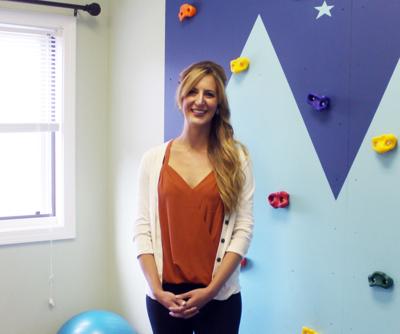GILFORD — Buttoning a shirt, zipping a jacket and holding a toothbrush are not skills we often associate with medical offices or therapy services.
But for Michelle Philpot — an occupational therapist and owner of Kids Achieve, a child-oriented outpatient practice geared to helping kids reach physical milestones, improve their fine motor skills and overcome sensory deficits that may be getting in the way of growing and learning — perfecting routine movements through stress-free play is a goal accomplished in small steps.
Her clinic at 36 Country Club Road resembles an indoor playground — with a safety mat to cushion falls as children scale climbing walls to retrieve pieces they can insert in a jigsaw puzzle after they climb down. There’s a swing suspended from a ceiling clip that enables kids to swing in any direction, including a circle. A ball pit provides wraparound immersion — a surprisingly rich sensory experience. Weighted blankets and quiet spaces furnish retreats to relax and calm down.
“When you submerge, there’s pressure input, which helps your tactile system make connections,” Philpot said. “Sometimes kids get carsick because of a difficulty processing movement."
In Philpot’s experience-rich space, children can swing fast, slow, in a straight line and “sometimes kids will spend 15 to 20 minutes going in a circle.”
At first, many are uncomfortable having their feet leave the ground. Climbing to collect puzzle pieces gives them a distracting, immediate goal while they develop motor coordination and learn to take risks. Her rooms feature tools to increase tolerance, confidence and expertise.
“It’s an engaging, play-based approach where they don’t realize they’re working on these skills,” Philpot explained. “I have a lot of crash pads, pillows and mats so kids feel safe.”
The last decade witnessed a rise in children ages 3 to 17 diagnosed with autism, cerebral palsy, blindness and attention deficit hyperactivity disorder, or ADHD, now a regular presence in classrooms nationwide. Individual education plans that provide student accommodations for learning and testing are also on the uptick, more numerous and commonplace after COVID, according to many school officials, including in the Lakes Region.
The pandemic ushered in more screen time for even the youngest kids. Social isolation reached levels antithetical to child development, social and physical skills acquisition and mental wellness, Philpot said.
“Houses are not the sensory-rich experience that playgrounds and outdoors are,” she said. Teachers, parents and health care providers have seen a swell in sensory processing challenges and emotional dysregulation as a result of quarantining at home, without school, day care and regular visits with grandparents providing opportunities to interact, observe and learn through trial and error.
Play is how kids learn through seven senses key to normal development — including taste, smell, touch, sight, hearing, movement and body awareness.
“The most formative years are when they’re little and the brain is accessing that sensory information” and organizing it, Philpot said. After lengthy periods of isolation, by the time they go to school, children can have a hard time learning to take risks. They can be hesitant or resistant, defaulting to safety while they question what their bodies can do and become anxious before they try. Children can fear new experiences, which weave the fabric of growing up.
That’s where Kids Achieve comes in — offering a unique occupational therapy service to clients from toddlers to young adults.
“Within a safe clinic setting, I push them to the just-right challenge, a little further in each activity over time. My goal is that they transfer them outside to other people and other places,” Philpot said. “It’s all about building and maintaining that safe rapport.”
According to Centers for Disease Control data in 2018, 1 in 44 children are diagnosed with autism. The journal Pediatrics, comparing results of national health interview surveys conducted from 2009 to 2001 and from 2015 to 2017, found a 17% increase in children ages 3 to 17 with a developmental disability.
A culture of wariness and overprotection, magnified by COVID, has robbed youngsters of necessary human experiences.
“The most import thing is to get the baby out and moving and figuring out what their bodies can do,” Philpot said.
What can parents do to make a richer early childhood experience?
“The most important thing is to get kids to play and use their imagination,” Philpot said. “A stick becomes a fairy wand or a baseball bat.” It’s critical to provide opportunities for unstructured play in a variety of environments, including the beach, the snow, and at home by getting down on the floor for "tummy time."
The crawling mechanism is tied to brain development, she added. Messy play in mud is a circus for the senses.
“Involve them with cooking as early as possible, mixing different things,” Philpot said. Even though it may be difficult to carve out time, play dates are invaluable — and so is game time with parents, which teaches winning, losing gracefully and taking turns.
“I feel for parents. It’s another thing on the to-do list. It’s so crucial to their child’s development to interact with others,” Philpot said.
She tailors activities to children’s needs and skill levels, and can focus on fine motor, emotional and sensory tolerance, and gross motor skills.
For more information, call 978-308-2457 or email michelle@kidsachievenh.com.
Editor's note: This story has been updated to correct contact information for Michelle Philpot at Kids Achieve.


















(0) comments
Welcome to the discussion.
Log In
Keep it Clean. Please avoid obscene, vulgar, lewd, racist or sexually-oriented language.
PLEASE TURN OFF YOUR CAPS LOCK.
Don't Threaten. Threats of harming another person will not be tolerated.
Be Truthful. Don't knowingly lie about anyone or anything.
Be Nice. No racism, sexism or any sort of -ism that is degrading to another person.
Be Proactive. Use the 'Report' link on each comment to let us know of abusive posts.
Share with Us. We'd love to hear eyewitness accounts, the history behind an article.